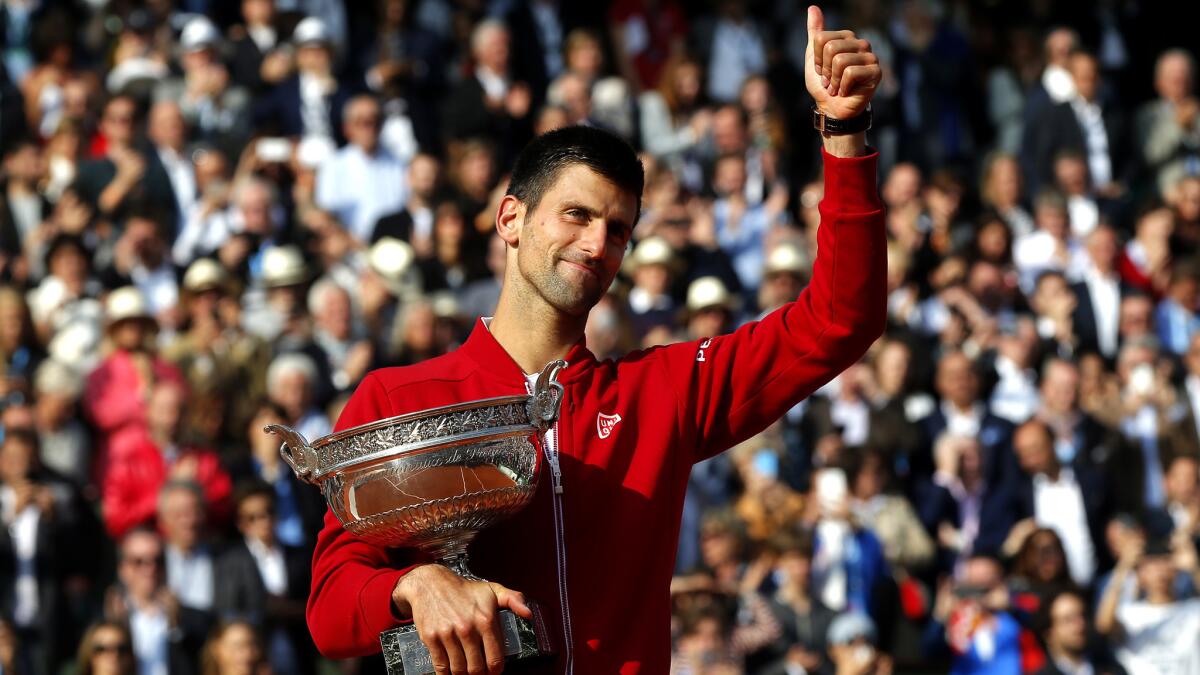A number of tennis players dismiss risk of Zika exposure at Rio Olympics as minimal

- Share via
Reporting from Toronto — Jack Sock’s Olympic reconnaissance mission included an evening helicopter tour with tennis colleagues including fellow American John Isner as they took in the sights of Rio de Janeiro. They played in the Rio Open in February and Sock chatted with locals.
About Zika, in fact.
“They said it got blown way out of proportion,” Sock said this week at the Rogers Cup. “They said it wasn’t as big a deal as people were making it. Obviously there was a concern, there’s been some cases… I’m not really worried.
“John actually got bit by a mosquito or two and he’s fine.”
Now Sock is going to the Olympics next month in Rio. Isner, meanwhile, won’t be going, not because of the mosquito bites and Zika, but because of scheduling concerns during an especially busy summer on the tour.
To stay home or to skip Rio has not been an easy question for the top men and women on the tennis circuit because of concerns about the Zika virus. Even at this late date, some are still debating the risks and additional withdrawals would not surprise.
Among those using Zika as a reason — or one of them — for not going to Rio are Wimbledon finalist Milos Raonic of Canada, three-time Olympian Tomas Berdych of the Czech Republic and No. 5-ranked Simona Halep of Romania.
Top-ranked Novak Djokovic of Serbia admitted that he did engage in additional fact-finding about the disease. The only major omission on Djokovic’s glittering career resume happens to be an Olympic gold medal in singles. He won bronze in 2008 in Beijing.
“I did get more information on it,” Djokovic said Wednesday after his opening match in Toronto. “My decision is to go to the Olympic Games, because from the information and facts that I got, it’s not as it’s presented, it’s not as dangerous.
“Of course there is always a possibility that you can get that virus, but I think, you know, maybe the fuss and the buzz about that virus has been created with some kind of other intent. But I’m not going to get into that. But, you know, for me it’s safe enough and I’m going to go.”
The mosquito-borne virus, for which there is no vaccine, can cause birth defects to infants born to women infected with the virus and sometimes can lead to neurological issues.
Dr. Jeffrey Klausner, professor of medicine in the division of infectious diseases and in the Program of Global Health at the David Geffen School of Medicine at UCLA, has been a frequent advisor to the Centers for Disease Control (CDC) and the World Health Organization (WHO). He spoke about the “relative” risks faced by tennis players and golfers at the Olympics
“There are important risks: about tennis elbow, sprained ankle, strained back from exuberant sport play,” he said in an interview with The Times. “But the risk of Zika at this time of the year, given the amount of mosquito activity, is very very low.
“We talk about relative risks. So there’s a much greater risk of being injured in a motor vehicle collision than there would be from serious consequences from Zika virus infection.”
For Berdych, those were risks he was unwilling to take. He revealed his decision on his Facebook page recently and said this week that it was not a decision he took lightly. At the 2004 Olympics, Berdych defeated Roger Federer in the second round.
“At first I was definitely talking to my family and the doctor and people around it,” Berdych said. “Basically, no one is going to guarantee you that you’re not going to get it or there is a low chance. The chance is still there.
“These days, I don’t think I’m in the position where I want to take the risk. Even if there is 10 doctors and they tell you there is a low chance that you are going to catch it.
“You have the option to choose. You don’t have to go.”
Golf has been hit hardest by Olympic withdrawals from stars Jason Day, Rory McIlroy, Jordan Spieth, Dustin Johnson and Adam Scott. Golf is rejoining the Olympic program for the first time since 1904. Initially, the criticism leveled at the golfers was pointed, especially from icon Gary Player, who said in an interview with Stuart Varney of Fox Business, “The excuse about Zika is feeble.”
Berdych said his decision was slightly easier because he has competed in the Olympics three times.
“I have to say I think if this would be my first Olympics, I might be looking at it a little different,” he said. “Or the decision would be a bit more difficult. I don’t think it would change in the end. If this would be my first, basically, ‘OK, I would be the age of [Alexander] Zverev [of Germany] or guys like that, I could play another two or three after.’”
Sock, for his part, was just as adamant about his desire to take part in the Olympics.
“For me, it’s something I would never miss, if I had the chance to represent my country on the biggest stage in sports,” he said. ““For me, it’s a no-brainer. Things could happen there, I would still go and still risk it.”
Twitter: @reallisa
Go beyond the scoreboard
Get the latest on L.A.'s teams in the daily Sports Report newsletter.
You may occasionally receive promotional content from the Los Angeles Times.




